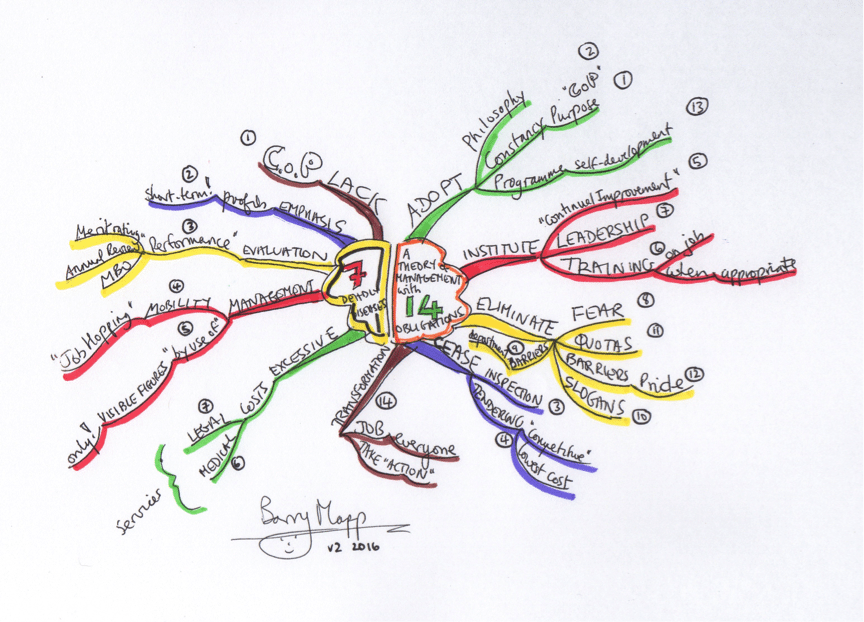Summarising (and thus communicating) information
Episode #9 of the course “Creating creation companies” by Barry Mapp
In the last episode, we introduced the concept of mind mapping. It is a technique that allows the brain to use Hunt’s L-mode and R-mode brain “wetware.” It is an ideal planning, summarizing, and communication tool for use in any creation company.
In day one of this course, we looked briefly at Deming’s seven deadly diseases of western management. Deming also had 14 points for good management. Here is a mind map that summarizes both Deming’s 14 obligations for managers and the seven deadly diseases. This demonstrates the ability of the mind map to summarize complex data; here, there are 21 total points summarized through the use of only ten groupings. Not only does the mind map enable a big list of ideas to be summarized clearly on one sheet of paper, but this also helps to prevent overloading the working memory, making it much easier to memorize and remember the information (in fact, mind mapping was originally devised as a memory/study tool).

All of Deming’s 14 points fit very coherently into the ethos of a creation company.
We’ve already covered Deming’s seven deadly diseases of western management in episode two, but let’s take this opportunity to have a quick overview of Deming’s 14 obligations for management using the mind map above as our guide. Mind mapping is great for convergent thinking and reducing complexity (multiple ideas) to a simpler format (fewer categories). The numbers on the mind map show Deming’s original numbering of the 14 points, while the numbers in the text below show the order on the mind map.
1. Deming suggested that organizations should adopt what he called the “new philosophy.” If you read up on this, you’ll see that his new philosophy took a “new science” approach to human behavior, management, and learning.
2. Particularly important was the need for leaders to adopt a constancy of purpose for the business. This is then something that never waivers with time—something that all staff can use as a guide for their individual interactions with customers and suppliers. In 2009, Simon Sinek (“Start with the Why”), in one of the most-viewed TED talks, told us the importance of purpose, but Deming was there over 50 years earlier!
3. Deming also spoke about the need for organizations to adopt a program of self-development for all staff (and leaders should lead with this and not exclude themselves from personal development). Today, it is much easier (thanks to learning platforms like Lynda, Teachable, and Udemy) for staff to identify their own learning needs and take action, with the business providing some or all of the funding to do this.
Leaders were obligated to institute:
4. A program of continual improvement throughout the business to ensure the work system and processes were optimized.
5. A program to encourage and develop leaders and leadership skills from within the business, knowing that a company can display stunning growth and improvement if potential leaders are identified and encouraged.
6. A program of training on the job (he was not a fan of blanket training for everyone, nor for training in the lecture room).
Then Deming said there were a series of things that leaders were obligated to eliminate (some of these overlap with the seven deadly diseases):
7. Drive out fear throughout the organization (and stop playing the blame game, which Deming recognized as always sabotaging improvement of the system).
8. Eliminate quotas (look this up if you want to know more!).
8. Eliminate the barriers to employees’ pride in their work.
10. Eliminate all those so-called “motivational” slogans based on old psychology thinking.
11. Remove departmental barriers and inter-departmental competition that only serve to sub-optimize the business system.
And there were two things that leaders had to stop doing:
12. Cease the dependence on mass inspection. Instead of inspecting the product for quality after production, infuse quality at the beginning using process improvement techniques to ensure no raw materials were wasted for the sake of quality.
13. Cease the practice of lower-cost tendering, which led to suppliers cutting corners in order to win the tender.
Deming was passionate that transformation was everyone’s business.
Recommended book
Share with friends

